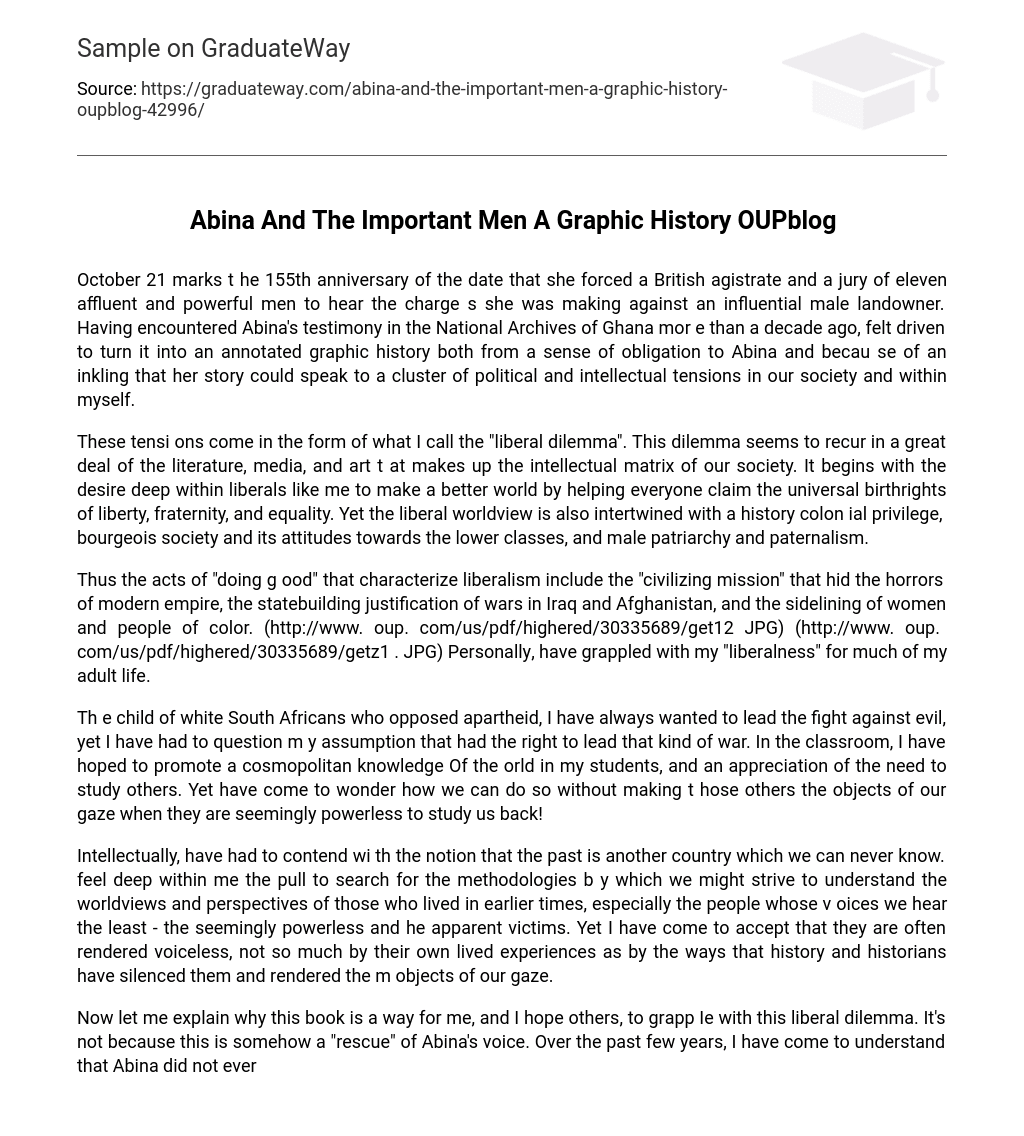October 21 marks t he 155th anniversary of the date that she forced a British agistrate and a jury of eleven affluent and powerful men to hear the charge s she was making against an influential male landowner. Having encountered Abina’s testimony in the National Archives of Ghana mor e than a decade ago, felt driven to turn it into an annotated graphic history both from a sense of obligation to Abina and becau se of an inkling that her story could speak to a cluster of political and intellectual tensions in our society and within myself.
These tensi ons come in the form of what I call the “liberal dilemma”. This dilemma seems to recur in a great deal of the literature, media, and art t at makes up the intellectual matrix of our society. It begins with the desire deep within liberals like me to make a better world by helping everyone claim the universal birthrights of liberty, fraternity, and equality. Yet the liberal worldview is also intertwined with a history colon ial privilege, bourgeois society and its attitudes towards the lower classes, and male patriarchy and paternalism.
Thus the acts of “doing g ood” that characterize liberalism include the “civilizing mission” that hid the horrors of modern empire, the statebuilding justification of wars in Iraq and Afghanistan, and the sidelining of women and people of color. (http://www. oup. com/us/pdf/highered/30335689/get12 JPG) (http://www. oup. com/us/pdf/highered/30335689/getz1 . JPG) Personally, have grappled with my “liberalness” for much of my adult life.
Th e child of white South Africans who opposed apartheid, I have always wanted to lead the fight against evil, yet I have had to question m y assumption that had the right to lead that kind of war. In the classroom, I have hoped to promote a cosmopolitan knowledge Of the orld in my students, and an appreciation of the need to study others. Yet have come to wonder how we can do so without making t hose others the objects of our gaze when they are seemingly powerless to study us back!
Intellectually, have had to contend wi th the notion that the past is another country which we can never know. feel deep within me the pull to search for the methodologies b y which we might strive to understand the worldviews and perspectives of those who lived in earlier times, especially the people whose v oices we hear the least – the seemingly powerless and he apparent victims. Yet I have come to accept that they are often rendered voiceless, not so much by their own lived experiences as by the ways that history and historians have silenced them and rendered the m objects of our gaze.
Now let me explain why this book is a way for me, and I hope others, to grapp Ie with this liberal dilemma. It’s not because this is somehow a “rescue” of Abina’s voice. Over the past few years, I have come to understand that Abina did not ever need rescuing for her own sake. She was tough, she was expressive, she found for herself ways offi hting the powers that impeded her. Rather, the book represents my realization that Abina’s voice needed to be brought out and int erpreted for our sakes, because she has so much to teach us about a better way of being in the world.
This is why much of this book is actually about us. In interpreting Abina’s stor y in graphic form, I and my accomplices ” Liz Clarke, the artist, and Charles Cavaliere, my beloved editor at Oxford – chose to reveal ev erything and try to hide nothing. Rather than pretending that we are the objective, allknowers, we lay out clearly the limitations of our ork, the ethical issues that bedevil us, the problematic relationship we have with Abina. We also carefully place our interpretation ne Xt to the original document that bears Abina’s words.
We are, in effect, asking students and colleagues and readers to question our wor k, and to develop their own understandings. As a way of grappling with the liberal dilemma this book both accepts the idea that it is good to study others and the need to question why and what we are doing when we interpret their words for ourselves. It es pecially asks this question in light of the power and wealth ifferential between Abina and ourselves. will not pretend that I don’t love the Abina have constructed in my mind, ev en though she is only an unreal representation of the real thing.





